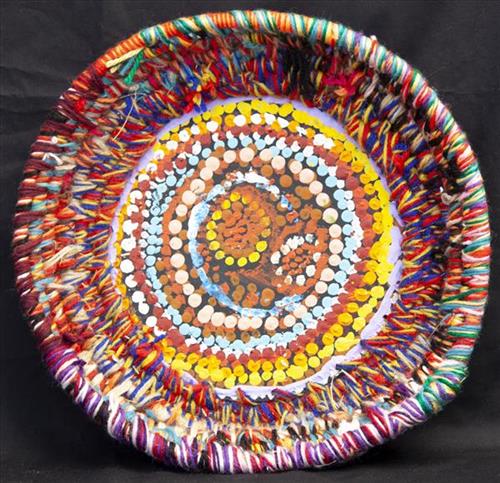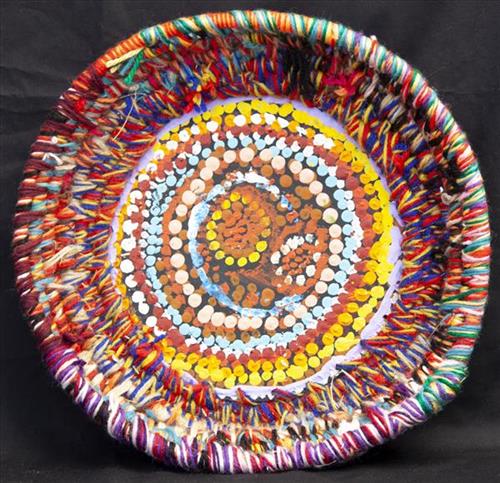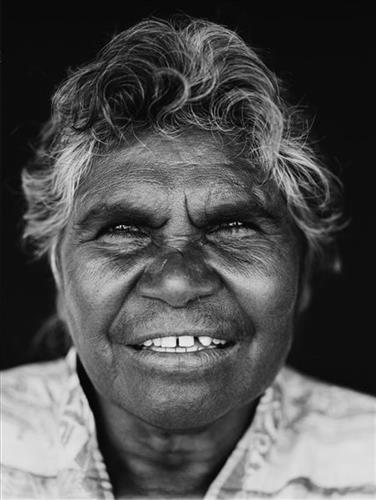Biography:
“I been painting in Jigalong long time. I’ve been working at the school there. Take the kids to school. Long time I been working there and at Punmu school, yeah for the kids, yeah long time. I been working and I tell a story for the children.
Now I learn [to paint] myself. I do it myself. I been do drawing, nice colours and then think, think, think. Thinking in my head. And thinking what I can draw with. Just draw it first and do it slowly like that, yeah? Yuwayi (yes).”
- Helen Dale Samson
Helen Dale Samson is a Warnman woman and custodian of the Karlamilyi (Rudall River) region, where her family travelled during the pujiman (traditional, desert dwelling) era. She is the youngest sister of fellow Martumili Artists Jatarr Lily Long and Wurta Amy French, but unlike her sisters, she was born in Jigalong Mission and has no memory of her parents. Her family had decided to relocate to the mission in order to be reunited with family members that had already moved in from the desert, and to access an assured supply of rationed food. Dale grew up in the mission dormitory, schooling and working during the week, but spent her weekends and holidays camping in the Country surrounding Jigalong and Puntawarri with her extended family.
Once married, Dale lived around Puntawarri and Nguyakurlu rockholes, walking and hunting there. Later, like many Martu, she worked at various stations around the Pilbara, including Mundawindi (Mundiwinti) and Sylvania Stations. In more recent years Dale returned to Jigalong Aboriginal community, where she continues to live today with her children and grandchildren.
Dale has established a reputation as a dedicated and innovative painter and weaver. She paints about the old mission days and the places she and her ancestors travelled, along with their associated Jukurrpa (Dreaming) stories. Dale’s vibrant paintings meld a naive Western style with unique, textured motifs and multiple perspectival views of her Country. She is particularly adept at describing the gorgeous array of flora that covers Martu Country, abstracting flowers and trees into beautiful patterns.
Helen Dale Samson is a Warnman woman and custodian of the Karlamilyi (Rudall River) region, where her family travelled during the pujiman (traditional, desert dwelling) era. She is the youngest sister of fellow Martumili Artists Jatarr Lily Long and Wurta Amy French, but unlike her sisters, she was born in Jigalong Mission and has no memory of her parents. Her family had decided to relocate to the mission in order to be reunited with family members that had already moved in from the desert, and to access an assured supply of rationed food. Dale grew up in the mission dormitory, schooling and working during the week, but spent her weekends and holidays camping in the Country surrounding Jigalong and Puntawarri with her extended family.
Once married, Dale lived around Puntawarri and Nguyakurlu rockholes, walking and hunting there. Later, like many Martu, she worked at various stations around the Pilbara, including Mundawindi (Mundiwinti) and Sylvania Stations. In more recent years Dale returned to Jigalong Aboriginal community, where she continues to live today with her children and grandchildren.
Dale has established a reputation as a dedicated and innovative painter and weaver. She paints about the old mission days and the places she and her ancestors travelled, along with their associated Jukurrpa (Dreaming) stories. Dale’s vibrant paintings meld a naive Western style with unique, textured motifs and multiple perspectival views of her Country. She is particularly adept at describing the gorgeous array of flora that covers Martu Country, abstracting flowers and trees into beautiful patterns.





